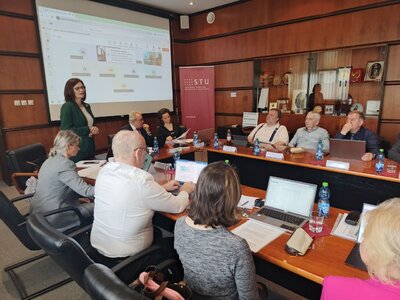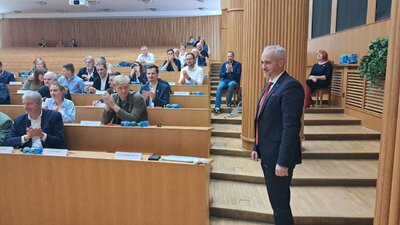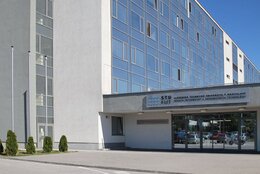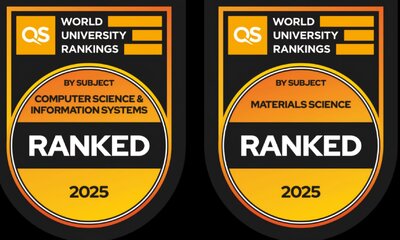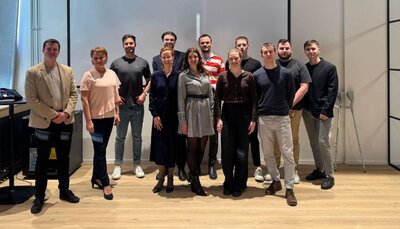Rector of the
Slovak University of Technology in Bratislava (STU)
Slovak Republic
invites applications for postdoctoral research positions to work on the following research projects:
1/ Development of Novel Organic Electronics Devices (Assoc. Prof. Martin Weis, Faculty of Electrical Engineering and Information Technology STU, martin.weis[@]stuba.sk)
Organic semiconductor devices using organic materials, such as thin film transistors, organic solar cells, and organic light-emitting diodes, have attracted a lot of research interests for their promising applications in various fields. With the development of organic materials of high mobility, recent trend in the research of organic field-effect transistors (OFETs) has been concentrated on the applied research and synthesis of novel materials; however, the development of device physics is still necessary. This research project focuses on material characterization of novel organic semiconductors, improvement of device fabrication technology, and development of organic electronics device characterization techniques suitable for device performance optimization. The goal of this project is preparation of OFETs for sensor systems or RFID applications. The research project has interdisciplinary nature and expects knowledge of physics, electronics, and chemistry.
2/ Machine Learning and Artificial Intelligence in Process Control and Automation (Assoc. Prof. Michal Kvasnica, PhD., Faculty of Chemical and Food Technology STU, michal.kvasnica[@]stuba.sk)
The aim of the project is to apply machine learning and artificial intelligence methods to synthesize control systems composed of three components: an inference mechanism, a process model, and a control strategy. The task of the inference mechanism is to deduce values of unmeasured parameters and process values from known measured signals. Subsequently, the inferred values are utilized by the process model to predict the future evolution of the controlled plant. Finally, the aim of the control strategy is to deduce optimal control actions based on the process model. The implementation of these blocks will be based on, respectively, machine learning techniques (SVM, PCA, etc.), deep neural networks, and model predictive control. The objective of the project is to extend existing machine learning and artificial intelligence techniques to systems that combine continuous dynamics with discrete logic (known as hybrid systems), to combine the methods in a systematic manner, and to implement developed algorithms in the form of open-source software packages.
3/ Research of progressive technologies for powder materials (Prof. Marián Peciar, PhD., Faculty of Mechanical Engineering STU, marian.peciar[@]stuba.sk)
Today's progressive technologies in the field of production and processing of powder organic and inorganic materials use these materials in the whole range of particle sizes - from nanoparticles to particles of a size of
several millimeters or even centimeters. In the current era of maximum usage of simulation and SW support of products in pre-manufacturing stages and the projecting of investment units characterized as INDUSTRY 4.0, it is
impossible to imagine non-standard properties in the processing of materials in highly automated production. This must be subordinated to such material preparation so that there are used materials in a standard form - i.e. absolutely homogenous from the standpoint of composition, unified as regards particle form and size, and marked by process characteristics with guaranteed and stable values of the relevant quantities. The goals of the presented research project in the field of process technology are non-traditional technologies and processes which, due to unavailable knowledge, have not as yet been incorporated into industry but which, as a result of the newest research outcomes, are moving into practice as unique innovative solutions securing competitiveness in the wider context. This refers chiefly to research in the processes of microgranulation of three-phase systems with a particle dense phase for multi-component mixtures and their mechanical-thermal characteristics, and the prediction of process characteristics. For the support of the research the newest and most currently developed simulation processes are used.
4/ Geoinformation technologies employment to reduce environmental hazards threatening the forest vegetation (Assoc. Prof. Juraj Janák, PhD., Faculty of Civil Engineering STU, juraj.janak[@]stuba.sk)
The forest vegetation is exposed to many environmental hazards that are related, e.g. to the climatic change or to the forest management methods. An employment of advanced information technologies together with new sources of spatial data is the key element to increase the effectiveness of management processes and to reduce negative impacts on the environment. The forest and landscape planning and management require up-to-date, accurate and correctly processed spatial information that are gathered mainly by the remote sensing of the Earth (RS). The workload of the postdoctoral researcher will be 1) processing and utilizing extensive amounts of data from the RS (data filtration, digital model delineation, and visualization), 2) spatial analyses in GIS including data uncertainty modelling, and 3) a validation of predictive models of environmental risks threatening the forest vegetation. The goal is to improve the precautionary measures and to contribute to the spatial-dynamic model of the bark beetle expansion in cooperation with external expert institutions.
5/ Research of boron doped diamond layers for application in highly effective degradation of pharmaceuticals, drugs and resistant types of microorganisms in waters (Ing. Marian Vojs, PhD., Faculty of Electrical Engineering and Information Technology STU, marian.vojs[@]stuba.sk)
The pollution of waste- and surface- waters by micropollutants (farmaceuticals, drugs) and bacteria resistant to antibiotics recently becomes alarming and extremely negatively acts on the human health and environment. Therefore, this project is focused on the issues of detection and highly effective treatment of wastewaters by advanced electrochemical oxidation methods using boron doped diamond (BDD) thin films. Diamond is a unique material from the mechanical and chemical point of view which can much more effectively generate OH radicals, singlet oxygen, ozone etc. and at the same time resist the electrochemical corrosion as any other material. Within the project activities, boron doped diamond layers will be grown, these will be used for electrodes fabrication and a system for detection and treatment of model and real wastewaters will be set up. Model samples of wastewaters with pollutants will be taken directly from the model wastewater plant (WWTP) installed at FEI STU and real samples will be taken through the cooperation with FCHPT STU from a chosen WWTP in the Slovak Republic. The results of effectiveness of micropollutants degradation will be correlated with complex measurements of physical (SEM, Raman spectroscopy, electrical measurements) and electrochemical (SW, DPV, CV, corrosion) properties of BDD. The results will be published in impacted journals and applied in a real WWTP in cooperation with a company producing household WWTPs as a stage for treatment of micropollutants and resistant bacteria.
Call opening: 23. 8. 2017
Application deadline: 18. 9. 2017
Job open time: 2. 10. 2017
Minimum Experience/Education: Ph.D. or equivalent doctorate in appropriate field awarded no more than 3 years ago
Other conditions: EU residency
Applications should be send electronically to research@stuba.sk. In case of questions about this positions contact research@stuba.sk or directly the mentor.
Candidates should send written application for the postdoc position, CV, description of research or artistic activities, overview of publications or artistic activities.
Address for the applications:
Rektorát STU
Útvar vedy a medzinárodnej spolupráce
Vazovova 5
SK - 812 43 Bratislava

